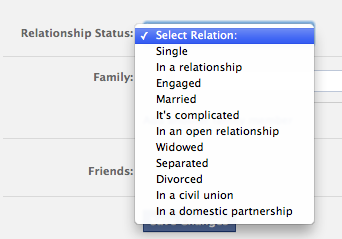The couple who Facebooks together, stays together
Becoming “Facebook official” is a milestone in modern romance, and new research suggests that activities on the popular social networking site are connected to whether those relationships last.
Catalina Toma, an assistant professor of communication arts at the University of Wisconsin–Madison, is the first researcher to track dating couples over time in order to examine the link between how they present themselves on Facebook as a couple and the longevity of their relationships.

In a new study published in the current issue of the journal Cyberpsychology, Behavior, and Social Networking, Toma used the “See Friendship” application (freely available on Facebook profiles) to document the Facebook activity of heterosexual college-aged dating couples. Participants also answered a series of questions about their relationships and how committed they felt to their partners.
She followed up six months later to find out if they were still an item. Results showed that certain Facebook self-presentational elements were positively linked to participants’ relationship commitment and their likelihood of staying together with their partner: being listed as “in a relationship,” posting photos with their partner, and writing on their partner’s wall.
“The claims people make about themselves in public are likely to be very influential in how they think about themselves,” says Toma, who studies online self-presentation and how emotional well-being is affected by social media. And Facebook is a place where users assemble an unprecedented audience of hundreds — or more — of friends, family members and acquaintances to share life events with. “Now we’re finding that these public self-presentations performed on Facebook also affect how people feel about a relationship partner.”

Catalina Toma
Photo: Michael Trevis
The reason why public self-presentations on Facebook are linked with how couples think about themselves might be the same as why people engage in public declarations of love via weddings, Toma says.
“People declare their love, they make vows in front of friends and family, they take photographs, and they exchange rings,” she says. “Online claims are very meaningful psychologically, and I think a big reason for that is the access to this diverse and wide audience.”
A finding Toma did not expect as she examined couples’ online activity: having more mutual friends on Facebook was negatively associated with relationship commitment. “We think that having more mutual friends signals having a greater social network, and this greater network might include more alternative romantic partners,” Toma says.
She found one other surprise, too: Partners writing a lot of posts on the participants’ Facebook walls was negatively related to their relationship commitment. Toma says it appears there could be a double standard at work. People perceived writing posts on a partner’s wall as a sign of commitment, but might consider posts from a partner on their own wall as sign of possessiveness or over-sharing.
Toma says although Facebook was originally designed as an online yearbook, it has evolved into something much more powerful. “Now we’re finding that it touches many aspects of our lives, including how we feel about ourselves and our romantic relationships.”
Tags: communication arts, research, social media




